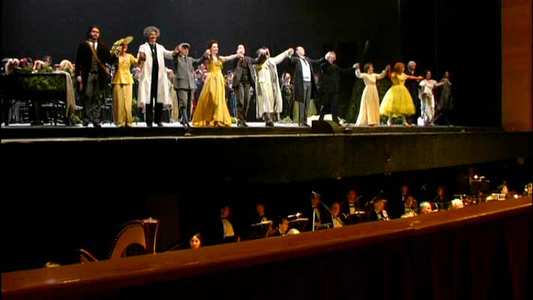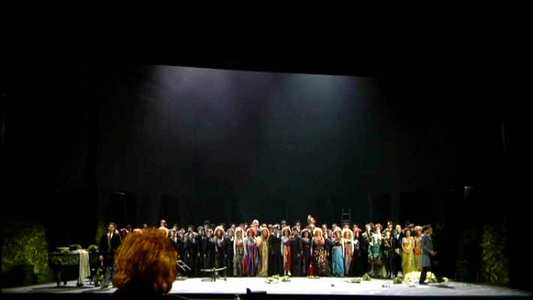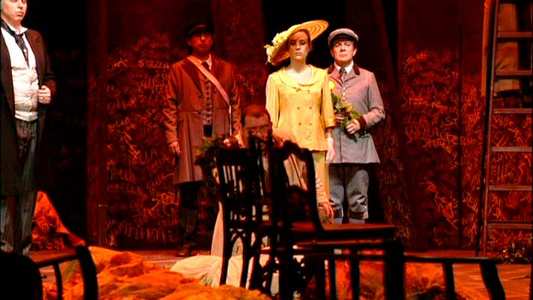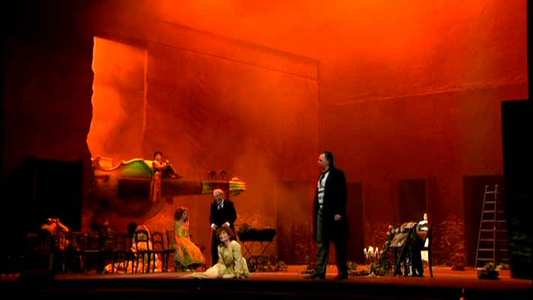Offenbach: Les Contes d`Hoffmann (Guingal)
Introduction
A performance of Offenbach`s `grand operetta` (ok, a little cruel) from the impressive Palacio Euskalduna, Bilbao in May 2006.
Quite a complicated plot regarding the poet and musician, Hoffmann, who is torn between the love of his art (personified by `The Muse`) and three specific but completely different women, Olympia (actually an automaton created by the ubiquitous Dr. Coppélius), Guiletta (a courtesan who steals reflections), and Antonia, who sings herself to death, poor girl.
Hoffmann is almost destroyed by his feelings for each of these women, but is persuaded by his Muse to use the grief to fuel his art (and I suppose keep `her` alive at the same time).

Video
I was very impressed by the way this NTSC DVD conveys the incredibly subtle lighting used in the production, and it has little problem in dealing with extremes.

Audio
The DTS Surround is excellent, creating a nice balance between pit and stage, and picking up plenty of detail in the orchestral parts, including a few slips (can`t believe we didn`t have all the harp notes in the Barcarolle). Perhaps I`m in a picky mood today.

Features
Extras include an interesting but far too brief set of `interviews` with Maria Bayo, Aquiles Machado and the chairman of ABAO (the group who put on the operas in Bilbao), and a short essay by Heather Hadlock which accompanies the booklet. The Illustrated Synopsis is definitely worth watching here as it explains the plot in great detail, although much of it still confuses me.

Conclusion
It may be a bit insensitive, but I`ve always considered this opera to be a bit of a curate`s egg. Offenbach had been spending his life waiting to find the subject, and inspiration for a `grand` opera which he wanted to set above the more trivial, but extremely popular operattas for which he was better known. Much of the music is certainly above and beyond his other work, but then there are plenty of `longeurs` (a shame for a piece with relatively short acts) as well.
Luckily, this production, in both performance and design, create something quite special. Giancarlo del Monaco has turned the work into quite a dark and nightmarish trip into an artist`s troubled mind, and there is little to alleviate this feeling. As I mentioned before, the lighting is quite spectacular and this is caught brilliantly here (especially in the Act 2 septet), but unfortunately, some of the camera shots (when they aren`t shaking) miss a lot of the details of the stage action (and this is where more detailed explanation of the production would have helped enormously in the additional `interviews`).
Alain Guingal does what he can with what`s on offer, and the orchestra, in general, play very well indeed. The chorus also put on a good show, and whatever they lack in finesse is definitely made up for in enthusiasm and sheer sound.
As is expected, a production of Hoffmann stands or falls by the quality of the epnoymous hero`s singing, and luckily Aquiles Machado is up to the task yet again (less `static` than his Rodolfo in La Bohème, but equally as impressive in the vocal stakes).
The other principals acquit themselves well, especially Milagros Poblador (Olympia), who is dressed up like something out of `Whatever Happened to Baby Jane?` and has to carry off some ferocious vocal gymnastics while waddling about like the mannequins in `Chitty Chitty Bang Bang` (just to prove I watch other things as well).
Konstantin Gorny (in the multiple roles of Lindorf, Coppélius, Dr. Miracle and Dapertutto) sings every bit of French in the style of a Russian, but you get used to it, and he has a very impressive voice.
Maria Bayo is quite moving in her role as Antonia, and it in this final act where Offenbach really shows he had the quality of invention to which he had aspired.
It a nice touch to finish a show with a Basque folk song (as they do here with `Agur Jaunak`) and interesting to see everyone stand as if it were a national anthem (well, most stand, some leave, and some just look confused and swig out ot their water bottles). There is obviously a lot of pride in this region, not only for their culture, but for success in staging seasons of operas which are almost sold out even before the public knows what is being performed. Long may it continue.
Your Opinions and Comments
Be the first to post a comment!